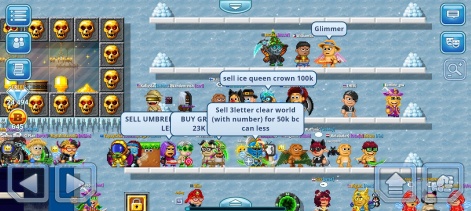By Kim Soares, CEO of Social First
Player-driven economies are an important part of many games and for some games they are an integral part without which the game as a whole wouldn’t function. Playing the economy game is interesting for players not only in tycoon games (which are not that big of a genre these days) and can be the main motivation of play for many.
In modern game development, it is important to understand player motivations. In the free-to-play games that dominate the market, it is equally important to understand how to build an interesting, dynamic and long lasting player-driven economy.
What I have seen in many successful games, both as a player and game developer, is that well designed in-game economy can be a major success factor; Player-driven economy makes the whole game more appealing for the community and for some players the economy aspect is the main motivation.
Player motivations vary a lot between individual players and game genres; exploration, stories, fighting, discovery, creativity, competition and more. In any successful MMO for example, player-driven economies create additional motivations like wealth creation, production, asset value speculation and trading.
Resource gathering and then producing items from those resources is the base for any strong in-game economy. These two things allow players to specialize and adopt a profession within the game. For example, mining resources is the basis for all production in EVE Online and without some players being active miners there would be no space ships, radars, weapons and so on.
This kind of primary production of raw materials can be very tedious and players often refer to it as 'grinding' for a reason. That being said, grinding is not inherently negative and its appeal and power to motivate some players should be understood.
Offering players ways to create wealth by putting in time and effort can be as strong a motivation in games as in real life.Kim Soares
Wealth creation is a strong long-term motivation for players
Production of items from raw materials is usually a less tedious affair, though not one filled with too much excitement either. Still, both of these offer players ways to create wealth by putting in time and effort and that can be as strong a motivation in games as in real life. In games, it can be even stronger motivation as arguably unlike real life, you can reach goals very quickly.
Many players just purchase the end products, be it a sword, health potion or spaceship. But for some players, the appeal, excitement and wealth creation comes from playing the economy game i.e. speculating with the value of those items; buying low and selling high. As in real life, this part of player-driven economies often yields the largest profits but can also lead to big losses.
In social games, this whole value chain can be controlled by groups of players; clans, guilds, corporations… The name varies from game to game but these kinds or groups can often extract more value as they can manipulate the market supply and demand.

From a game developer’s point of view, it is very important to build a deep and robust economy system that allows players to engage in these different activities. These are very complex systems and they will need balancing and optimising. It can be as trivial as nerfing or buffing something like ore yield rate or weapon’s damage and as game-changing as introducing a new currency. Any changes should be clearly communicated to the player community to avoid uncertainty. Even dramatic changes won’t kill a player-driven economy but the uncertainty and churn it creates can be very detrimental.
Player-driven economies are expanding outside games
It is also very important to understand how the economy can affect other parts of the game. For example, wealth accumulation is a good motivation for many players and it makes the whole economy more dynamic. But if some players get too rich, it can lead to those players being able to skip content, lowering the motivation of your often most dedicated user segment. Too dramatic wealth accumulation can also lead to inflation that hurts new players the most and so negatively affects early retention.
In this day and age, the NFT elephant in the room is blockchain. Fact is that players do want to trade game items (or whole accounts) outside the game too, as anyone who has played Runescape, World of Warcraft, Pixel Worlds or Valorant can tell you. The fact is that, at least for now, gamers do not want to trade NFTs nor use crypto currency.
A well constructed and dynamic player-driven economy will be a huge boost to your game’s retention, organic growth and monetisation. In the near future, the player-driven economies will increasingly expand outside of games too. First movers are using blockchain technology but my view is that real mass-market adoption will happen when someone makes a unified real-money storefront for game item trading.
About Social First
Social First is a team of accomplished game developers who have formed an independent studio based in Helsinki, Finland. CEO Kim Soares and President Mikko Kähärä founded Social First in 2021 with the mission to create games that are social experiences, span decades and extend beyond gaming; giving players platforms to create meaningful relationships with people all across the world. The team is backed by Play Ventures and a syndicate led by Joakim Achrén. For more information on Social First and their work, please contact Sophie Riordan, PR & Communications, at sophie.riordan@socialfirstgames.com. For their press kit, click here.






















